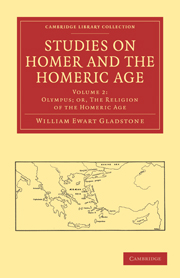Book contents
- Frontmatter
- Contents
- OLYMPUS: OR THE RELIGION OF THE HOMERIC AGE
- SECT. I On the mixed character of the Supernatural System, or Theo-mythology of Homer
- SECT. II The traditive element of the Homeric Theo-mythology
- SECT. III The inventive element of the Homeric Theo-mythology
- SECT. IV The Composition of the Olympian Court; and the classification of the whole supernatural order in Homer
- SECT. V The Olympian Community and its Members considered in themselves
- SECT. VI The Olympian Community and its Members considered in their influence on human society and conduct
- SECT. VII On the traces of an origin abroad for the Olympian Religion
- SECT. VIII The Morals of the Homeric Age
- SECT. IX Woman in the heroic age
SECT. I - On the mixed character of the Supernatural System, or Theo-mythology of Homer
Published online by Cambridge University Press: 05 October 2010
- Frontmatter
- Contents
- OLYMPUS: OR THE RELIGION OF THE HOMERIC AGE
- SECT. I On the mixed character of the Supernatural System, or Theo-mythology of Homer
- SECT. II The traditive element of the Homeric Theo-mythology
- SECT. III The inventive element of the Homeric Theo-mythology
- SECT. IV The Composition of the Olympian Court; and the classification of the whole supernatural order in Homer
- SECT. V The Olympian Community and its Members considered in themselves
- SECT. VI The Olympian Community and its Members considered in their influence on human society and conduct
- SECT. VII On the traces of an origin abroad for the Olympian Religion
- SECT. VIII The Morals of the Homeric Age
- SECT. IX Woman in the heroic age
Summary
Though the poems of Homer are replete, perhaps beyond any others, with refined and often latent adaptations, yet it may be observed in general of the modes of representation used by him, that they are preeminently the reverse of systematic. Institutions or characters, which are in themselves consistent, probably gain by this method of proceeding, provided the execution be not unworthy of the design. For it secures their exhibition in more, and more varied, points of view, than can possibly be covered by the more didactic process. But the possession of this advantage depends upon the fact, that there is in them a harmony, which is their base, and which we have only to discover. Whereas, if that harmony be wanting, if in lieu of it there be a groundwork of fundamental discrepancy, then the conditions of effect are wholly changed. The multiplied variety of view becomes a multiplication of incongruity; each new aspect offers a new problem : and the more masterly the hand of the artist, the more arduous becomes the attempt to comprehend and present in their mutual bearings the pictures he has drawn, and the suggestions he has conveyed.
Thus it has been with that which, following German example, I have denominated the Theo-mythology of Homer. By that term it seems not improper to designate a mixture of theology and mythology, as these two words are commonly understood. Theology I suppose to mean, a system dealing with the knowledge of God and the unseen world: mythology, a system conversant with the inventions of man concerning them.
- Type
- Chapter
- Information
- Studies on Homer and the Homeric Age , pp. 1 - 38Publisher: Cambridge University PressPrint publication year: 2010First published in: 1858



